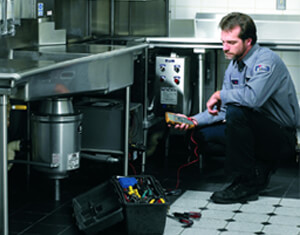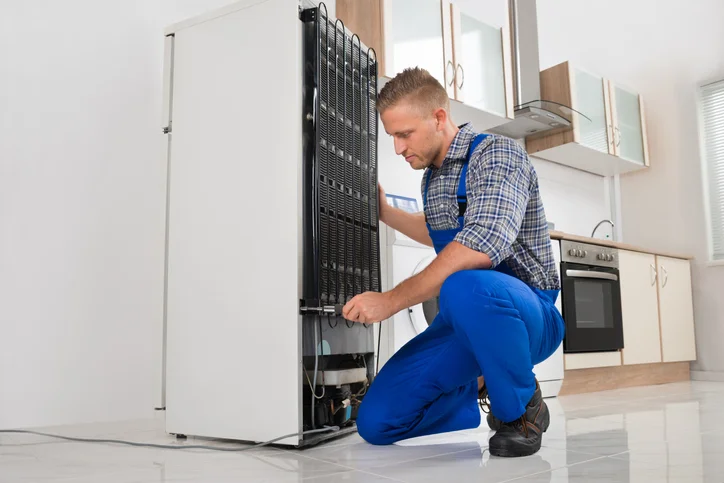Quick Guide from Refrigerator repair experts Dependable Refrigeration & Appliance Repair: What to Check Before Calling a Tech
Quick Guide from Refrigerator repair experts Dependable Refrigeration & Appliance Repair: What to Check Before Calling a Tech
Blog Article
Vital Tips for Effective Ref Repair Work to Expand Appliance Life-span
When it comes to your fridge, appropriate repair work and upkeep are important for longevity. Comprehending usual issues and recognizing when to act can make all the difference.
Understanding Common Refrigerator Troubles
Fridges are crucial in keeping your food fresh, but they can experience a series of common troubles that interrupt their efficiency. One frequent concern is inadequate air conditioning. If you discover food ruining quicker than common, inspect the thermostat setups or consider if the door seals are harmed. An additional usual trouble is too much sound, which could indicate a malfunctioning compressor or a falling short fan. You might additionally experience water merging inside or underneath the refrigerator; this commonly results from a clogged up defrost drainpipe or a faulty water line. Additionally, if your fridge's light isn't working, it can be a simple light bulb problem or an issue with the door switch. Ice buildup in the freezer can impede air movement and cooling efficiency. Recognizing these issues early can conserve you money and time in fixings, guaranteeing your fridge runs efficiently and efficiently.
Regular Maintenance Practices
To maintain your home appliances running smoothly, you need to remain on top of normal maintenance practices. Clean the condenser coils, examine the door seals, and keep an eye on the temperature setups to assure peak efficiency. These simple jobs can conserve you money and time on repair services down the line.
Clean Condenser Coils Routinely
Cleansing your condenser coils consistently can significantly improve your device's effectiveness. Dirt and dust build up on these coils in time, creating your device to work more difficult and eat more energy. To maintain them tidy, disconnect your appliance and very carefully eliminate any type of safety covers. Utilize a vacuum cleaner with a brush accessory or a soft brush to carefully remove particles. If needed, a combination of warm water and light cleaning agent can assist remove persistent grime. See to it to allow everything dry completely before reassembling and connecting the home appliance back in. Objective to cleanse your coils a minimum of two times a year, or a lot more often if you have pets or live in a dirty setting. This easy job can extend the lifespan of your home appliance considerably.
Inspect Door Seals
3 basic actions can assist you guarantee your appliance's door seals are in great condition. First, inspect the seals frequently for any type of splits, splits, or indicators of wear. These problems can bring about air leaks, impacting performance. Second, tidy the seals using warm, soapy water to get rid of any type of particles or crud. A tidy seal assures a limited fit and far better efficiency. Lastly, perform a straightforward test by shutting the door on a piece of paper. If you can easily draw it out without resistance, the seal might need replacing. By adhering to these steps, you'll keep your appliance's efficiency and long life, conserving you cash on power costs and repairs in the future.
Screen Temperature Level Setups
Frequently monitoring your appliance's temperature setups is crucial for best performance and efficiency. Whether you're dealing with a refrigerator, fridge freezer, or oven, watching on these settings can avoid lots of issues. For fridges, go for temperatures in between 35 ° F and 38 ° F; for freezers, stay 0 ° F. If the temperature levels are also high or low, your device may work harder, wasting power and shortening its life expectancy. Make use of a thermometer to check these settings consistently, particularly after significant adjustments, like relocating your appliance or readjusting the thermostat. If you observe fluctuations, readjust the setups as necessary and seek advice from the user handbook for advice. By remaining proactive about temperature level tracking, you'll ensure your appliances run smoothly and last longer.
Repairing Air Conditioning Concerns
When your refrigerator isn't cooling effectively, it can lead to spoiled food and wasted money, so dealing with the problem immediately is critical. Start by inspecting the temperature setups to validate they're at the recommended degrees, generally around 37 ° F for the fridge and 0 ° F for the freezer. If the setups are appropriate, inspect the door seals for any kind of spaces or damages; a malfunctioning seal can permit warm air to go into.
Next, check out the vents inside the fridge and fridge freezer. Validate they're not obstructed by food products, as this can interrupt air flow. Pay attention for the compressor; if it's not running or making uncommon sounds, it might need focus. Check the condenser coils, typically situated at the back or bottom of the unit. Dirt and debris can collect, causing cooling problems. Tidy them with a vacuum or brush to optimize efficiency. If issues linger, the appliance man it may be time to call an expert.
Repairing Water Leakage and Ice Build-Up
If you're taking care of water leakage or ice accumulation in your home appliance, it's vital to identify the source of the issue. By identifying where the water is coming from, you can protect against more issues and prevent costly repair services. Allow's explore some effective strategies to take on these typical troubles.
Determine Leakage Sources
Just how can you properly recognize the sources of go to my blog water leakage and ice build-up in your home appliances? Beginning by evaluating the seals and gaskets on your fridge and freezer doors. A used or damaged seal can permit warm air to go into, triggering condensation and ice. Next off, examine the drainpipe pan and water drainage system for clogs or obstructions; a backed-up drainpipe can bring about water pooling. Seek any type of loose connections in the water line, which can create leaks. Take a look at the defrost drain for ice build-up, which can interrupt proper drainage. By systematically inspecting these areas, you'll identify the source of the issue, permitting you to take the necessary actions to fix it and expand your appliance's lifespan.
Stop Ice Formation
To avoid ice development in your appliances, beginning by validating the temperature settings are ideal. If your refrigerator or freezer is also cold, it can lead to extreme ice accumulation. Check the door seals consistently; damaged seals can allow warm air in, triggering condensation and ice formation.
Maintain the device well-ventilated and stay clear of congestion, as this can obstruct airflow - Dependable Refrigeration & Appliance Repair Service, Oro Valley, AZ 85755. Consistently thaw your freezer if it doesn't have an automatic defrost feature.
If you notice water leak, identify and repair any kind of blocked drainage holes, as they can contribute to ice buildup. Tidy the coils and verify they're functioning properly to preserve peak efficiency. Taking these actions will click over here now assist expand your home appliance's life expectancy and efficiency.
Resolving Noisy Refrigerator Sounds
While it might seem startling, a loud fridge frequently signifies minor concerns instead than significant breakdowns. Recognize the resource of the noise. Usual offenders include the compressor, followers, and water lines. If you hear a buzzing sound, it might be the compressor striving; this could simply be a normal operation noise.
Next, examine for loose products inside. Sometimes, containers or racks can rattle, creating undesirable sound. Tighten or reposition them to get rid of the noises.
If you see a clicking sound, it could be the defrost timer. This is typically safe but could suggest it requires evaluation.
Lastly, validate your refrigerator is level. An unbalanced device can generate vibrations and noise. Make use of a level to examine, and adjust the feet if needed. Attending to these problems without delay can help preserve your fridge's efficiency and prolong its life expectancy.
When to Change Components vs. Complete Replacement

Think about the expense of repair services versus the appliance's worth. Furthermore, if you discover ongoing problems that maintain repeating, it's a sign that your home appliance has gotten to the end of its life.
Knowing When to Call an Expert
Exactly how can you tell when it's time to call in a professional for appliance repair service? If your appliance quits working altogether or frequently trips circuit breakers, it's an additional red flag.
You ought to likewise consider your very own comfort degree with repair work. If you're not sure concerning detecting the issue or do not have the right tools, it's finest to connect for help. Remember, attempting complicated fixings can lead to even more damage and even security threats.

Regularly Asked Inquiries
How Commonly Should I Tidy the Fridge Coils?
You ought to clean your fridge coils every 6 months. This aids maintain effectiveness and protects against getting too hot. If you notice extreme dirt or pet hair, clean them more often to assure your refrigerator runs efficiently.

Can I Utilize Vinegar for Cleansing My Refrigerator?
Yes, you can use vinegar to clean your fridge! It's an outstanding all-natural cleaner that removes odors and stains. GE appliance repair Oro Valley Dependable Refrigeration & Appliance Repair Service. Just blend it with water, use it to surface areas, and wipe down for a fresh, tidy fridge
What Temperature Should My Fridge Be Establish To?
You should establish your fridge to 37 ° F(3 ° C) for suitable food preservation. This temperature keeps your food fresh while protecting against wasting, guaranteeing your grocery stores last much longer and decreasing waste. It's a simple adjustment you can make!
Does a Fridge Need to Be Leveled?
Yes, your fridge needs to be leveled. If it's unequal, it can impact cooling down performance and trigger excess sound. Examine the progressing legs and adjust them to assure appropriate equilibrium for suitable efficiency.
Just How Can I Decrease Refrigerator Energy Intake?
To lower your refrigerator's power usage, keep it clean and well-ventilated, inspect door seals for leakages, established the temperature in between 35-38 ° F, and prevent overwhelming it. These steps can significantly lower your power expenses.
Report this page